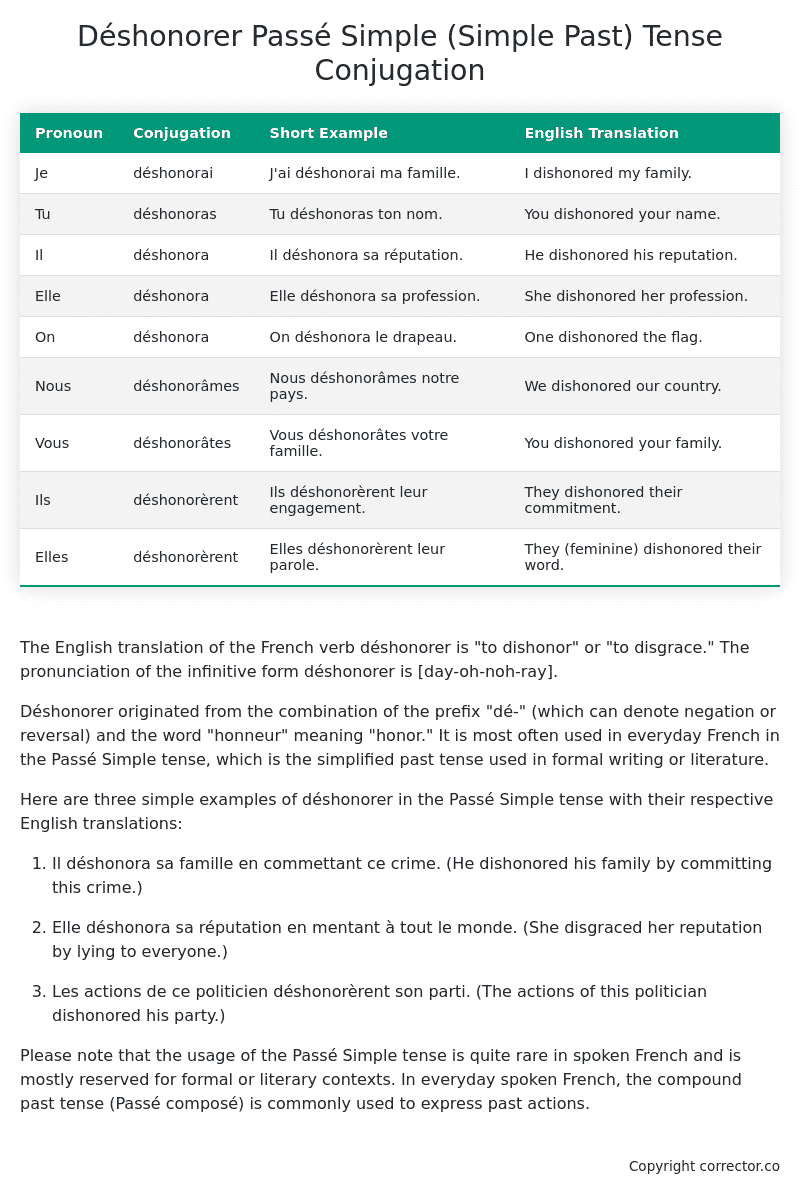Passé Simple (Simple Past) Tense Conjugation of the French Verb déshonorer
Introduction to the verb déshonorer
The English translation of the French verb déshonorer is “to dishonor” or “to disgrace.” The pronunciation of the infinitive form déshonorer is [day-oh-noh-ray].
Déshonorer originated from the combination of the prefix “dé-” (which can denote negation or reversal) and the word “honneur” meaning “honor.” It is most often used in everyday French in the Passé Simple tense, which is the simplified past tense used in formal writing or literature.
Here are three simple examples of déshonorer in the Passé Simple tense with their respective English translations:
-
Il déshonora sa famille en commettant ce crime.
(He dishonored his family by committing this crime.) -
Elle déshonora sa réputation en mentant à tout le monde.
(She disgraced her reputation by lying to everyone.) -
Les actions de ce politicien déshonorèrent son parti.
(The actions of this politician dishonored his party.)
Please note that the usage of the Passé Simple tense is quite rare in spoken French and is mostly reserved for formal or literary contexts. In everyday spoken French, the compound past tense (Passé composé) is commonly used to express past actions.
Table of the Passé Simple (Simple Past) Tense Conjugation of déshonorer
| Pronoun | Conjugation | Short Example | English Translation |
|---|---|---|---|
| Je | déshonorai | J’ai déshonorai ma famille. | I dishonored my family. |
| Tu | déshonoras | Tu déshonoras ton nom. | You dishonored your name. |
| Il | déshonora | Il déshonora sa réputation. | He dishonored his reputation. |
| Elle | déshonora | Elle déshonora sa profession. | She dishonored her profession. |
| On | déshonora | On déshonora le drapeau. | One dishonored the flag. |
| Nous | déshonorâmes | Nous déshonorâmes notre pays. | We dishonored our country. |
| Vous | déshonorâtes | Vous déshonorâtes votre famille. | You dishonored your family. |
| Ils | déshonorèrent | Ils déshonorèrent leur engagement. | They dishonored their commitment. |
| Elles | déshonorèrent | Elles déshonorèrent leur parole. | They (feminine) dishonored their word. |
Other Conjugations for Déshonorer.
Le Present (Present Tense) Conjugation of the French Verb déshonorer
Imparfait (Imperfect) Tense Conjugation of the French Verb déshonorer
Passé Simple (Simple Past) Tense Conjugation of the French Verb déshonorer (You’re reading it right now!)
Passé Composé (Present Perfect) Tense Conjugation of the French Verb déshonorer
Futur Simple (Simple Future) Tense Conjugation of the French Verb déshonorer
Futur Proche (Near Future) Tense Conjugation of the French Verb déshonorer
Plus-que-parfait (Pluperfect) Tense Conjugation of the French Verb déshonorer
Passé Antérieur (Past Anterior) Tense Conjugation of the French Verb déshonorer
Futur Antérieur (Future Anterior) Tense Conjugation of the French Verb déshonorer
Subjonctif Présent (Subjunctive Present) Tense Conjugation of the French Verb déshonorer
Subjonctif Passé (Subjunctive Past) Tense Conjugation of the French Verb déshonorer
Subjonctif Imparfait (Subjunctive Imperfect) Tense Conjugation of the French Verb déshonorer
Subjonctif Plus-que-parfait (Subjunctive Pluperfect) Tense Conjugation of the French Verb déshonorer
Conditionnel Présent (Conditional Present) Tense Conjugation of the French Verb déshonorer
Conditionnel Passé (Conditional Past) Tense Conjugation of the French Verb déshonorer
Conditionnel Passé II (Conditional Past II) Tense Conjugation of the French Verb déshonorer
L’impératif Présent (Imperative Present) Tense Conjugation of the French Verb déshonorer
L’impératif Passé (Imperative Past) Tense Conjugation of the French Verb déshonorer
L’infinitif Présent (Infinitive Present) Tense Conjugation of the French Verb déshonorer
L’infinitif Passé (Infinitive Past) Tense Conjugation of the French Verb déshonorer
Le Participe Présent (Present Participle) Tense Conjugation of the French Verb déshonorer
Le Participe Passé (Past Participle) Tense Conjugation of the French Verb déshonorer
Struggling with French verbs or the language in general? Why not use our free French Grammar Checker – no registration required!
Get a FREE Download Study Sheet of this Conjugation 🔥
Simply right click the image below, click “save image” and get your free reference for the déshonorer Passé Simple tense conjugation!

Déshonorer – About the French Passé Simple (Simple Past) Tense
Formation
Usage
Narration
Historical Context
Interactions with other tenses
Passé Composé
Imparfait
Conditional and Subjunctive
Summary
I hope you enjoyed this article on the verb déshonorer. Still in a learning mood? Check out another TOTALLY random French verb conjugation!


